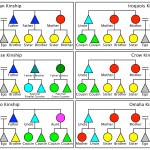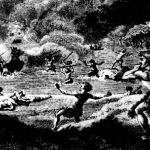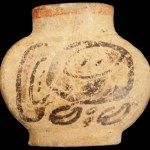Anthropology
This is nice.
Karl Eccleston and Fiona Pepper are amazingly good actors. The writing is excellent as is the directing. The subtext. THE SUBTEXT IS BRILLIANT.
When I was living with the Efe Pygmies in the Ituri Forest, they would imitate French and English speakers while ranting about specific people who had annoyed or amused them. It was easy to tell which they were doing ... French vs. English. But it only sounded like people imitating people, it didn't sound like the real thing. I remember Sid Caesar doing this as part of his regular routine in several languages, and talking about…
I gave a talk at the Brookdale Public Library last night as part of the celebration of DNA day. DNA Day, or DNAD for short, was created about the time of the "completion" (more or less) of the Human Genome in 2003, and is set to be on the date of the publication of the famous research on the structure of DNA.
The point of the talk was to link behavioral biology and the anthropological study of kinship with the practice of conducting personal genealogy. There was a time when I did a fair amount of genealogical research, in connection with historic archaeology, which in turn was part of…
All human hunter-gatherer groups that have been studied incorporate meat in their diets. Studies have shown that the total dietary contribution of meat varies a great deal, and seems to increase with latitude so that foragers in subarctic and arctic regions eat a lot of meat while those living near the equator eat less. It is probably true that tropical and subtropical foragers obtain more of their calories from plants than from meat over any reasonable amount of time. The meat consists primarily of mammals for most groups, but fish, birds, reptiles, and invertebrates can reach high…
Napoleon Chagnon spent years living among the Yanomamo of Venezuela and wrote, among other things, a classic ethnography still used widely in anthropology classes. It came to pass that Chagnon and his ethnography came under scrutiny, actually a few waves of scrutiny, from practitioners of cultural anthropology in part because his monograph depicted the Yanomamo as “fierce people” and this characterization of them was used, misused really, against them by outside forces including the government to justify their “pacification.” The Yanomamo were indeed being abused by these outside forces, and…
Until a few minutes ago, I didn't even know what the heck Vocal Fry is. Apparently some people have gotten really annoyed about it, as it is a speech mannerism that has emerged among young folks, who are always annoying, and especially females, who are always annoying. Apparently. (I also did not know that until a few minutes ago! I'm learning a lot of new stuff today!)
It's been written up in a scientific journal (see below), in popular media, and it was brought to my attention by a facebook post of Debby Goddard's. But of all the sources I've seen, the following video best describes the…
Following on discussion arising from this post, here is a revised discussion of throwing in human evolution.
The question of diversity in science, and more specifically, success for women, is often discussed in relation to bench or lab oriented fields. If you read the blogs that cover this sort of topic, they are very often written by bench scientists, for bench scientists, and about bench scientists. Which makes sense because most scientists probably are bench scientists.
Here I want to do two separate but related things. I want to discuss certain aspects of the nature of fieldwork in…
This post has been moved, with a copy of the very important comments, to THIS LOCATION, otherwise known as Greg Laden's Blog.
Please click through and visit the post, and the blog!
Today is Thanksgiving in the US. Happy Thanksgiving. Let us being with a word of advice:
TAKE THE TURKEY OUT OF THE FREEZER NAO!!!
And now ... a feast.
The enemy has arrived, in force, outside your village. The men are armed and wearing the symbols of war, which is appropriate because your group and the group milling about outside your walled settlement are at war. One of the men, wearing war garb but adorned also with white flagging to indicate a peaceful intent attempts to enter your village but is stopped by guards. They converse briefly and the guards allow the man to crawl into…
Left: Efe (Pygmy) man. Right: White guy.
Some of the people who live in the rain forest of Central Africa are known widely as "Pgymies." That word...Pygmy...is considered problematic for a few different reasons. It refers to a person's physical appearance, because it means "small." The word is sometimes used in biology to refer to the smaller species among a group of closely related species, as in "Pygmy Hippopotamus" or "Pygmy Chimp." In English and probably some other languages, the term is used in a derogatory way to refer to someone who is perceived as not very smart, as in "Pygmy…
Over the last few weeks I've run into a few misconceptions about tobacco, as well as some interesting news, so I thought I'd share. If you already know some of this, forgive me, not everyone else does.
First, tobacco, Nicotiana tabacum, is a member of the Solanaceae family of plants, which from a human perspective has got to be one of the most interesting plant families out there. It includes Belladonna, peppers, potatoes, and tomatoes. So, from this one family of plants, you can kill your neighbor, have a nice meal, and a smoke a cigar afterward.
Tobacco is a Native American cultivar.…
The presumption being examined here is that humans are divisible into different groups (races would be one term for those groups) that are genetically distinct from one another in a way that causes those groups to have group level differences in average intelligence, as measured by IQ. More exactly, this post is about the sequence of arguments that are usually made when people try to make this assertion.
The argument usually starts out noting that there are dozens of papers that document group differences in IQ. I'll point out right now that most of those papers are published in journals with…
Science Education Researcher Marie-Claire Shanahan, primatologist Eric Michael Johnson, and I joined Desiree Schell on on Skeptically Speaking to have a conversation very apropos this time of year in The West: The concept of Tradition. We said a number of very smart things which you can hear by clicking here and listening to the podcast.
I should mention that all four of us will be at Science Online 2012 in January.
Time for the thanksgiving story. But first, when you are preparing your Thanksgiving Turkey, you might want to keep this in mind.
And now ... a feast.
The enemy has arrived, in force, outside your village. The men are armed and wearing the symbols of war, which is appropriate because your group and the group milling about outside your walled settlement are at war. One of the men, wearing war garb but adorned also with white flagging to indicate a peaceful intent attempts to enter your village but is stopped by guards. They converse briefly and the guards allow the man to crawl into your…
Tradition. Not just a song from Fiddler on the Roof.
You know the refrain: "The Papa, the Papa! Tradition." It's a great play but it is firmly rooted in the patriarchy, as "tradition" often is.
There are many ways to define "tradition" and we can look it up somewhere and have a flameware over dictionary meanings if you want. But instead I'll tell you what I think the word means, roughly, generally, and subject to revision.
First, "tradition" is a feature of culture that simply refers to practices that are habitual. A subset of "traditions" are formalized or regularized, like holidays in…
Behaviors are not caused by genes. There is not a gene that causes you to be good, or to be bad, or to be smart, or good at accounting, or to like bananas. There are, however, drives. "Drives" is a nicely vague term that we can all understand the meaning of. Thirst and hunger are drives we can all relate to. In fact, these drives are so basic, consistent and powerful that almost everyone has them, we share almost exact experiences in relation to them, and they can drive (as drives are wont to do) us to do extreme things when they are not met for long periods of time. While eating…
Richard Tokumei has written a book that is so bad he is ashamed to put his own name on it. "Richard Tokumei" is the pen name of a 'writer/editor in Southern California [with] degrees in Humanities and Phychology from the University of California Berkeley" and he has produced a book designed to anger everyone who hears of it in order to create needless sensation and thus, sell copies. Which, once people get their hands on, will make rather low quality toilet paper.
Monkeys On Our Backs: Why Conservatives and Liberals Are Both Wrong About Evolution includes an inexplicable mix of "correct"…
It's all just a matter of calibration. Let me 'splain.
One day I was driving along a suburban street with the sun low on the horizon and the windows covered in rain drops from a sudden sun-shower moments earlier, insufficiently caffeinated and distracted by something. That's when I saw a large black dog transmogrify into a lawn mower. No, seriously, I really did see this. It reminded me of the time I saw a giant UFO over Boston Harbor (details here: The Night I Was Almost Abducted by Aliens in Boston).
What happened with the dog was this: The distraction was a set of children and other…
On the Move: How and Why Animals Travel in Groups, edited by Sue Boinski and Paul Garber is a compendium of academic research on ... well, on how and why animals travel in groups. Notice of this book is a fitting start to a series of reviews of migration-related books that is part of Migration Week on GLB. (For an overview of the Bigness and Vastness of bird migration in particular, see A Question of Migration.)
Group movement is only rarely migration, though the two phenomena are overlapping subsets. An example of group movement that demands some explanation is that found in chimpanzees…
A lot of paleolithic diet and exercise books, many how to be a hunter-gatherer guides for the suburbanites, and numerous biologically-based-sounding self-help volumes based mainly on woo have been produced since The Paleolithic Prescription: A Program of Diet & Exercise and a Design for Living was published in 1989. To my knowledge, none of the subsequent books has been as useful or as well done, even if TPP requires some updating.
I'm not recommending the book as a self help guide, but rather, as a way of linking the scientific evidence for human diet and activity, based mainly on…










